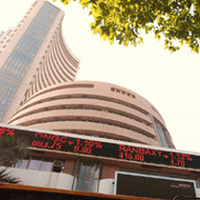In a year when Indian shares have hit record highs, the country's embattled fund managers are headed for a milestone of their own: their worst performance since the global financial crisis in 2008.
The poor showing comes at a bad time for an industry already under pressure from a market regulator angry about results and an ongoing exodus of retail investors from Indian stocks.
India's top 20 diversified equity funds, with $12.4 billion in assets, are up only 0.5 per cent this year, Thomson Reuters data shows, even as the BSE Sensex has risen 8 per cent after hitting a record high early this month.
That is the worst relative performance since 2008, which also saw the BSE's Sensex benchmark hit a record high before the global market meltdown. Although each fund has its own benchmark measure, performance against the Sensex is the broad yardstick used by investors.
Their poor showing could make the Securities and Exchange Board of India (SEBI) scrutinise more harshly applications for new funds.
Chastened fund managers blame a volatile year that saw the rupee plunge to a record low, as well as a drop of as much as 10.2 per cent in the BSE index through mid-August before it surged to a record high.
"If you followed the news flow at the beginning of the year, coupled with all the uncertainties about the Fed taper and rupee correction, our mandate was to be very, very conservative," said Prashant Jain of HDFC Asset Management, one of India's most famous stock pickers. "Clearly that played to our disadvantage."
HDFC Asset Management's Top 200 Fund is flat this year, while its Equity Fund is down 2.2 per cent. India's two largest equity funds, both managed by Jain, each manage more than $1.5 billion.
In addition to being overly cautious at the beginning of the year, Jain was hurt by bigger exposure to state lenders such as State Bank of India, which have struggled.
Meanwhile, Reliance Capital Asset Management, India's second-largest fund house, was heavily weighted towards riskier midcaps, which went on to struggle, whereas blue chips outperformed on strong foreign inflows.
"Foreign investors have been more active than domestic investors, and as a result of that, the money has been largely concentrated in very few large companies," said Sunil Singhania, head of equities at Reliance Asset Management.
"You have had this temporary aberration where nothing except the top companies have done well," he added.
Singhania's two funds, with a combined $1.4 billion in assets, are down 5.3 per cent and 7.9 per cent, respectively, according to Lipper data.
Fund managers have also made mistakes selecting blue chips. For example ITC Ltd was among the top picks at six of India's top ten equity funds, but its shares fell by almost a fifth from its all time high earlier this year after the cigarette and consumer products maker posted unexpectedly slow sales.
Bad timing
At an investment conference in June, SEBI chairman U.K Sinha stunned his audience with a speech rebuking "non-serious" players and admonishing them to find a new business model. His remarks were seen to have been targeted at the smallest of India's 47 fund houses, most of which are unprofitable.
"I think SEBI has become very cognizant and proactive in terms of looking at fund houses and also individual schemes' performance, especially on how funds are doing compared to the benchmark," said Mahesh Patil, co-chief investment officer at Birla Sun Life Asset Management Co Ltd.
The government wants to encourage retail investors to put money into the stock markets. As part of that drive, SEBI this year proposed a slew of rules meant to protect retail investors.
Just this month, SEBI tightened disclosure rules by listed companies.
Although SEBI has not specified what actions it might take against under-performing funds, asset managers fear regulators could increase scrutiny of new funds.
Poor performance has contributed to net redemptions of 106 billion rupees by retail investors from equity funds this year, according to industry data. That marks the fourth year in five the industry has seen money flowing out, leaving managers to rely on lower-margin debt funds and advisory business.
Not every fund has struggled. The two biggest funds managed by S. Naren, chief investment officer of ICICI Prudential Asset Management Co, are up 9.2 per cent and 10.7 per cent respectively, thanks to a bias towards big caps early in 2013.
Globally asset managers have had a better run. Equity funds in the United States and Japan, two countries that have seen a rally in shares, have on average outperformed their respective broad market indexes, according to Lipper data.
However in Indonesia, another country dogged by a weakening currency, funds have lagged, posting an average rise of 3.2 per cent compared to the 4.5 per cent rise in the IDX Composite Index.
"It's very disappointing that the flagship equity funds in India have fared so poorly," said Dhirendra Kumar, CEO of mutual fund tracker Value Research. "SEBI scrutiny has put asset managers on their toes and performance this year does not win them any favours with the regulator."






